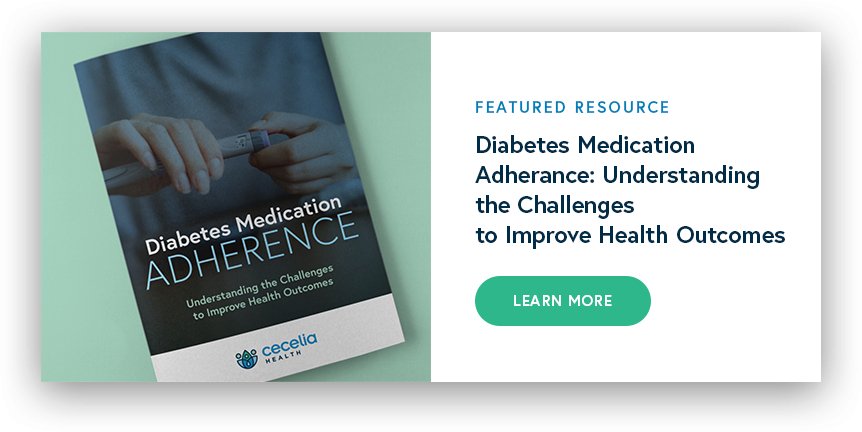For people living with diabetes and related chronic conditions, adhering to a prescribed medication schedule can be a challenge. Many patients face unique barriers to medication adherence.
According to the National Institute of Diabetes and Digestive and Kidney Diseases, 50% of medications for chronic diseases are not taken as prescribed. When people receive the help they need to make behavior changes and adhere to their medication, the impact on their health is often measurably positive.
The most important outcome of increased medication adherence is, of course, healthier people with improved qualities of life. But the impact can also be seen across the health system, from medical professionals to insurance providers to the pharmaceutical and device industries.
Since a health plan’s level of performance impacts both its reputation and the level of incentives it receives from CMS, maintaining high ratings is critically important. People with diabetes may measure progress through personal goal-setting and the effects on their day-to-day lives, but reporting systems can help quantify the impact of increased medication adherence by relating it to a health plan’s performance metrics.
Here are three common measures of health and performance for health plans, and how medication adherence in diabetes patients plays a role in improving each measure.
Healthy Days Measures
Health can often seem subjective. Whether someone “feels” healthy day-to-day can impact their behavior and their life. The Centers for Disease Control and Prevention (CDC) developed the Healthy Days Measures to track health-related quality of life (HRQOL), or “perceived physical and mental health over time.”
The Healthy Days Measures use core questions to ask people about their HRQOL, including questions such as, “Would you say that in general your health is excellent, very good, good, fair or poor?” and “During the past 30 days, approximately how many days did poor physical or mental health keep you from doing your usual activities, such as self-care, work, or recreation?”
Several organizations, including health insurance payers, have found the Healthy Days Measures useful for identifying health disparities, tracking population trends, and building initiatives for improving health.
For diabetes patients, medication adherence plays a significant role in the number of healthy days they experience per month. Medication adherence is a key aspect of managing this chronic disease, and poor management can affect a patient’s pain levels, vitality, energy, and more. Increased medication adherence can, as a result, lead to more Healthy Days.
Star Ratings
Medicare Advantage plans are given overall Star ratings based on how well they perform in five different categories:
- Staying healthy: screenings, tests, and vaccines
- Managing chronic (long-term) conditions
- Plan responsiveness and care
- Member complaints, problems getting services, and choosing to leave the plan
- Health plan customer service
In order to drive positive Star ratings for diabetes care, health plans need to focus on increasing diabetes medication adherence among members. Best practices for encouraging adherence include educating members on the importance of medication adherence, encouraging frequent clinic visits, and developing a regular behavior of refilling prescriptions.
HEDIS Measures
The National Committee for Quality Assurance’s (NCQA’s) Healthcare Effectiveness Data Information Set (HEDIS) is another widely used quality measure used to evaluate many aspects of a health plan’s performance.
Using more than 90 measures across 6 domains of care, HEDIS allows health plans to determine the percentage of their member populations that are compliant with specific treatment protocols.
When looking at the specific HEDIS measures for Comprehensive Diabetes Care (CDC), the focus is on members 18-75 years of age with a diagnosis of Diabetes (Type 1 and Type 2) who had each of the following during the measurement year:
- Hemoglobin A1c (HbA1c) testing
- HbA1c poor control (>9.0%)
- HbA1c control (<8.0%)
- HbA1c control (<7.0%) for a selected population
- Eye exam (retinal) performed
- Medical attention for nephropathy
- BP control (<140/90 mm Hg)
HEDIS measures are particularly important for helping health plans develop quality initiatives, build educational programs, and enhance diabetes care programs. By focusing on driving behavior change to increase diabetes medication adherence, HEDIS measures for CDC visibly improve. Increased medication adherence can lead to overall improvements in HbA1c control and other facets of self-management among members.
Increasing Diabetes Medication Adherence to Improve Quality Measures
What steps can payers take to help members better adhere to their prescribed medication and improve performance measures for diabetes care programs?
For many hard-to-reach and underserved populations, deep behavior change is needed to guide them towards a path of adherence. The best way to drive this kind of behavior change is through personalized, one-on-one coaching from a professional who has the time and resources to educate and support diabetes patients.
At Cecelia Health, we combine the clinical coaching of a Certified Diabetes Educator with proprietary technology to deliver a personalized coaching program to drive significant behavior change. With a 35% enrollment rate of identified members, our program has been clinically proven to improve health outcomes for members with wide-ranging social determinants of health by setting SMART goals around Gaps in Care.
Our programs are designed to complement existing disease management and care programs payers already run, to provide members with the most effective experience possible. Cecelia Health achieves an average 1.2 point reduction in A1C after 3 months of individualized coaching. Lowering A1C reduces the risk of heart attack, stroke, or death from cardiovascular causes by 57%.
To learn more about increasing success factors and improving quality measures for your health plan, contact Cecelia Health today.

